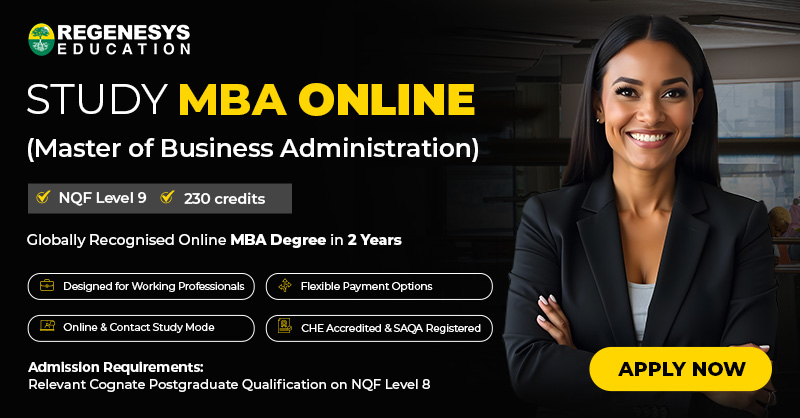Thinking about pursuing an MBA in South Africa? This detailed MBA programme guide SA breaks down everything you need to know – from study formats and degree requirements to career paths and funding options. Whether you’re weighing up full-time vs part-time MBA SA, curious about online MBA learning, or looking for the best MBA in South Africa, this guide offers a complete MBA overview. It also explores essential skills, entry criteria, and what to expect post-graduation.
In this article, we will explore the MBA programme guide SA, including essential skills, MBA full details on structure and duration, career opportunities, and how Regenesys can support your academic journey.
Table of Contents
- What is the Master of Business Administration?
- Why Study MBA in South Africa?
- MBA Course Curriculum & Duration
- Core Skills You Will Gain from an MBA
- Eligibility Criteria
- MBA Study Options in South Africa
- Career Opportunities After an MBA
- Industries Hiring
- MBA Fees & Funding Options in South Africa
- Conclusion
- MBA Programme Guide in SA – FAQ
What is the Master of Business Administration?
The Master of Business Administration (MBA) is a globally recognised postgraduate degree designed for professionals who aim to advance their careers, build strategic thinking skills, and lead organisations effectively.
It is offered at NQF Level 9 at Regenesys Business School in South Africa and provides 230 credits upon completion. The CHE-accredited programme generally spans two years and offers learners exposure to key business areas such as finance, operations, marketing, leadership, and corporate governance.
The following are the key features of the MBA programme guide SA:
- Qualification Type: Postgraduate Degree
- SAQA ID: 97886
- NQF Level: 9
- Credit Points: 230
- Duration: 2 Years
- Study Mode: Contact & Online
Whether you are aiming to manage a large team, lead innovation within a company, or launch your own business, the MBA provides the necessary academic foundation and professional confidence to get there.

Why Study MBA in South Africa?
South Africa is a unique blend of emerging markets, global industries, and entrepreneurial spirit, making it an ideal place to pursue an MBA. Local universities and business schools have structured their MBA programmes to reflect both international best practices and South African market needs. Affordability, local relevance, and accessibility are just some of the many reasons learners choose to study here.
Let’s explore the reasons in two important categories:
Industry Demand
The South African economy continues to demand skilled leaders capable of navigating complex environments. Here are a few reasons MBAs are in demand:
1. Evolving Business Landscape
With constant change in global and local markets, businesses are looking for forward-thinking professionals.
2. Digital and Strategic Transformation
South African organisations are embracing digital tools and strategies, increasing demand for MBA graduates.
3. Growth in Entrepreneurship
An MBA prepares you to lead or launch your own start-up in South Africa’s growing SME sector.
Career Relevance
An MBA helps professionals move from middle management to executive roles. The MBA programme guide SA highlights the following roles aligned with MBA outcomes:
1. Business Consultant
Advises organisations on growth strategies and operational improvements.
2. Corporate Strategist
Helps firms design long-term strategies.
3. Operations Manager
Oversees internal operations and boosts efficiency.
4. Entrepreneur
Leverages MBA skills to start or scale a business.
Find out Does an MBA Pay Off: Exploring the Financial and Career Benefits here
MBA Course Curriculum & Duration
The MBA programme guide SA outlines a well-rounded curriculum tailored for South African and international markets. It integrates real-world case studies, simulations, and group projects to prepare students for real challenges in business. Each module is aimed at enhancing managerial competence and leadership skills.
Here are the main components of the MBA curriculum:
1. Strategic Management
Focuses on long-term business planning and competitive strategy.
2. Financial Management
Develops budgeting, investment, and risk analysis skills.
3. Marketing Management
Covers branding, digital marketing, and customer analytics.
4. Human Resource Management
Explores staff development, team leadership, and performance management.
5. Operations and Supply Chain Management
Provides knowledge of production, logistics, and resource planning.
6. Entrepreneurship and Innovation
Promotes creative thinking and business start-up skills.
7. Business Research
Allows learners to apply their knowledge in a real-world business context.
Duration
Typically 2 years for full-time. Part-time or online modes may take up to 3 years, depending on pace and format.
Explore Core Subjects in MBA Curricula: A Detailed Overview here

Core Skills You Will Gain from an MBA
An MBA is more than a collection of academic subjects – it is designed to build a well-rounded leader. Through interaction with peers, projects, and instructors, students develop both hard and soft skills that are essential in modern workplaces. So, as noted in the MBA programme guide SA, this degree equips students with both hard and soft skills, preparing them for leadership roles in a variety of industries.
Here are the core competencies you’ll develop in an MBA programme:
1. Strategic Thinking
MBA students are trained to evaluate business environments, analyse trends, and create strategic plans. This enables graduates to drive long-term success within their organisations.
2. Analytical Decision-Making
You will develop the ability to interpret data, evaluate alternatives, and make informed business decisions. This skill is crucial for solving complex problems in real time.
3. Communication Skills
The programme helps you strengthen your verbal and written communication, allowing you to effectively pitch ideas, deliver presentations, and negotiate with stakeholders.
4. Problem Solving & Innovation
You’ll be trained to think critically and creatively, which allows you to identify innovative solutions to business challenges. This is vital in today’s rapidly changing environments.
5. Time & Project Management
Learn how to manage multiple responsibilities, meet deadlines, and lead cross-functional projects. These are critical skills for anyone juggling leadership duties with operational tasks.
6. Global Business Awareness
Exposure to international case studies and business practices will broaden your understanding of global markets. This is particularly beneficial for professionals working in multinational settings or aiming to expand abroad.
Explore Why Do an MBA Degree? A Path to Enhanced Skills and Professional Success here
Eligibility Criteria
Admission into a Master of Business Administration (MBA) programme typically requires applicants to meet a combination of academic and professional criteria. Programmes in South Africa require academic background, work experience, and a certain level of professional maturity to ensure students are ready to absorb and apply high-level business concepts.
To enrol in an MBA at Regenesys, you must meet the requirements outlined in the MBA programme guide SA:
- Relevant cognate postgraduate qualification on NQF Level 8
- Relevant Work Experience
- Basic computer skills, internet connection and relevant IT resources
- Competent in English, written and oral communication skills
MBA Study Options in South Africa
South African institutions offer a range of MBA study options to cater to the diverse needs of learners. Whether you are employed full-time or prefer virtual learning, you can find a mode that suits your lifestyle and commitments. One of the strengths of the MBA programme guide SA is its flexibility. Regenesys offers several study formats to suit your schedule:
Here are the study formats available:
1. Full-Time MBA
Best for students who can dedicate 2 years full-time. Offers a campus experience, networking, and quicker graduation.
2. Part-Time MBA
Ideal for working professionals. Courses run during evenings or weekends and extend over 2–3 years.
3. Online MBA
Provides flexible, anytime access to learning materials and forums. Ideal for students with family or travel constraints.
Choosing between full-time vs part-time MBA SA formats depends on your professional stage, personal responsibilities, and learning style.
Know How To Study MBA Online? Key Tips and Strategies for Busy Professionals here
Career Opportunities After an MBA
Graduates of an MBA programme in South Africa are in high demand across various industries, thanks to their strong business acumen, strategic thinking, and leadership capabilities. The qualification equips professionals with the tools needed to manage complex business environments, lead diverse teams, and drive organisational success.
As shown in the MBA programme guide SA, graduates are equipped for senior-level positions in diverse sectors. Potential career paths include:
1. General Manager
Leads business units or departments and oversees day-to-day operations.
2. Management Consultant
Works with organisations to solve complex problems and improve performance.
3. Chief Executive Officer (CEO)
The highest-ranking executive, responsible for strategic decisions.
4. Marketing Director
Develops and oversees the company’s marketing strategy.
5. Financial Analyst or Manager
Manages budgeting, investments, and financial strategy.
6. Entrepreneur
Starts and runs their own businesses, often using MBA-acquired skills.
Industries Hiring
An MBA qualification opens doors to a wide range of industries that value strategic thinking, leadership capabilities, and business acumen. In 2025, MBA graduates are in demand across both the private and public sectors, with many pursuing roles that require analytical decision-making and managerial expertise. The MBA programme guide SA highlights these key industries seeking MBA talent:
1. Financial Services
Commercial banks, insurance providers, asset management firms, and investment companies frequently seek MBA graduates for roles in finance, risk, compliance, and strategic planning.
2. Healthcare
Hospitals, pharmaceutical companies, and private healthcare providers value MBAs for positions in operations management, health finance, and healthcare administration.
3. Information Technology and Tech Start-ups
From large multinational tech firms to agile start-ups, the IT sector recruits MBAs for roles in project management, product development, data strategy, and digital transformation.
4. Retail and Fast-Moving Consumer Goods (FMCG)
Organisations in these sectors rely on MBA graduates to manage supply chains, lead marketing initiatives, and optimise operational efficiency in fast-paced environments.
5. Public Sector and Non-Governmental Organisations (NGOs)
Government departments, development agencies, and NGOs require business professionals with policy insight, project management skills, and financial oversight experience—areas where MBA graduates can contribute meaningfully.
MBA Fees & Funding Options in South Africa
Financing your MBA can feel overwhelming, but numerous support options make it manageable. Many South African institutions, including Regenesys, are committed to helping students access quality education through flexible funding solutions.
Here, the MBA programme guide SA provides practical options available through Regenesys:
1. Student Hero
A user-friendly platform that lets you compare finance offers from top providers at no cost.
2. Fundi
Offers tuition loans, device financing, accommodation support, and other essential tools to support your education.
3. FlexiPay
Our in-house payment solution designed to split tuition fees into manageable instalments.
4. Capitec Education Finance
Enables monthly repayments with discounted interest rates and extended terms.
5. Nedbank Education Loan
Offers tailored funding options with flexible repayment plans.
Note: All financial assistance is subject to eligibility. Students are encouraged to explore internal and external options to find the best fit.
Find out What Sets Regenesys Business School Apart in MBA Education? here

Conclusion
Pursuing an MBA is not just about gaining a qualification – it’s about stepping into a leadership role, mastering strategic thinking, and building a future-proof career. Whether you’re considering a full-time, part-time, or online route, this complete MBA programme guide SA has outlined all the critical aspects: from study modes and core skills to career paths and funding opportunities.
In a competitive and evolving market like South Africa, the MBA remains one of the most respected and impactful qualifications. It opens doors to high-level job roles, entrepreneurial ventures, and opportunities across various industries.
With flexible study options, practical curriculum, and tailored financial support, Regenesys is committed to shaping tomorrow’s leaders today. If you’re ready to take your career to the next level, consider the MBA programme at Regenesys Business School.
[Speak to an Advisor] | [Download Brochure] | [Apply Today]
MBA Programme Guide in SA – FAQ
Is an MBA in South Africa worth it?
Yes. The MBA programme guide SA confirms it opens doors to executive roles, raises earning potential, and builds networks.
Can I study MBA part-time or online?
Regenesys Business School offers a flexible and accredited online MBA programme that is suited for working professionals seeking to expand their knowledge and skills.
What are the MBA degree requirements?
You need a relevant postgraduate qualification, work experience, and proficiency in English.
What makes an MBA different from other business degrees?
An MBA is broader and focuses more on leadership and strategic decision-making.
Who should do an MBA in South Africa?
Professionals aiming for leadership, entrepreneurs, and specialists seeking career growth.







